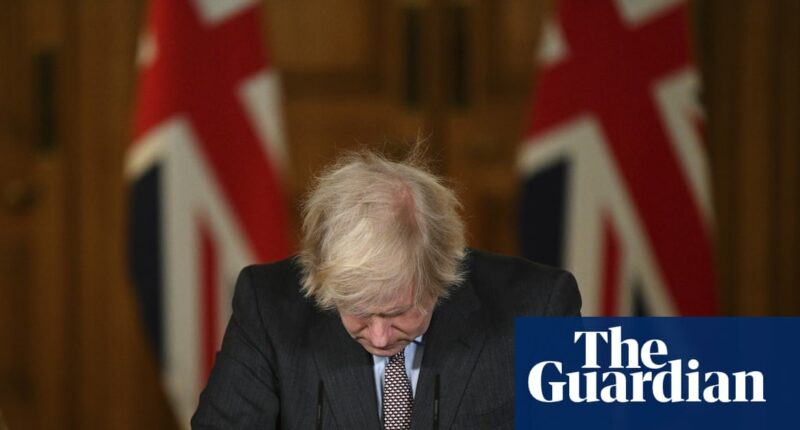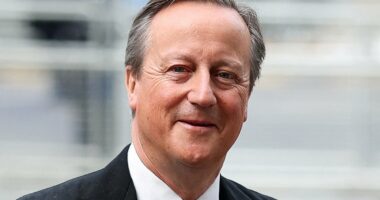Share this @internewscast.com
The UK’s approach to managing the Covid-19 crisis has been criticized in a recent official report, which described the response as “too little, too late.” The report highlights that implementing a lockdown just a week earlier could have potentially saved over 20,000 lives.
The document also delivers harsh criticism of the “toxic and chaotic” atmosphere within Boris Johnson’s Downing Street, noting that the former prime minister appeared to support this environment.
According to the report, the loudest voices dominated discussions, while female perspectives were largely ignored.
The authors refute the notion that a lockdown was unnecessary. They argue that without such measures, the resulting loss of life would have been “unconscionable and unacceptable.”
Spanning more than 750 pages in two volumes, the second part of the Covid inquiry delves deeply into how the government managed the pandemic. It presents a consistent narrative of delays, inaction, and a failure to learn from past mistakes.
The report provides a harsh assessment of the early days of the pandemic in 2020, labeling February as “a lost month.” It questions why Johnson did not lead any meetings of the Cobra emergency committee and points out that the Covid response effectively paused during the half-term holiday week.
If a lockdown had been imposed on 16 March, a week earlier than took place, modelling suggests this could have cut the number of deaths in England in the first wave of the virus by almost half, equating to 23,000 lives saved, the inquiry authors say.
The Covid-19 Bereaved Families for Justice UK group said the report showed Johnson had repeatedly delayed, ignored advice and “put his political reputation ahead of public safety”.
The group said: “While it is vindicating to see Boris Johnson blamed in black and white for the catastrophic mishandling of the pandemic, it is devastating to think of the lives that could have been saved under a different prime minister.”
Perhaps the most trenchant criticism is directed at Johnson and his team, notably his then adviser Dominic Cummings, who is described as central to a “culture of fear” inside No 10. The report also targets the three devolved governments, and others central to the process, such as scientific advisers.
“The inquiry finds that the response of the four governments repeatedly amounted to a case of ‘too little, too late’,” it reads. “The failure to appreciate the scale of the threat, or the urgency of response it demanded, meant that by the time the possibility of a mandatory lockdown was first considered it was already too late and a lockdown had become unavoidable.”
Many of the same mistakes – reacting too slowly and underestimating the speed and impact of Covid’s spread – were then repeated later in 2020, as restrictions were lifted and then belatedly reimposed in the face of infectious new strains, the report adds, calling this “inexcusable”.
Other findings include:
Strong criticism of Chris Wormald, who was the head civil servant at the health department and is now Keir Starmer’s cabinet secretary. The report said he had failed to correct the “over-enthusiastic impression” of the department’s work given by Matt Hancock, the then health secretary, and had failed to properly look into widespread doubts about Hancock’s effectiveness.
That while lockdowns were needed, they left “lasting scars” on society, particularly for children.
If ministers had acted swiftly with other measures to curb the spread of the virus, a complete lockdown might have been avoided, or at least have been shorter.
Communication with the devolved nations was poor, and the leaders of all the UK countries made errors.
The first volume of the report gives a chronology of the crisis, from the start of 2020 to the final lifting of restrictions, pointing to a consistent picture of inaction despite ever-mounting evidence about a new virus that was spreading around the globe and could be transmitted between people.
Events such as the early Covid crisis in Italy “should have prompted urgent planning across the four nations”, the report said, adding: “Instead, the governments did not take the pandemic seriously enough until it was too late. February 2020 was a lost month.”
While there is nothing to mandate that Cobra is always chaired by a PM, it was “surprising” that Johnson did not do this before March, the authors say, with some understatement.
“Mr Johnson should have appreciated sooner that this was an emergency that required prime ministerial leadership to inject urgency into the response,” concludes the inquiry, chaired by the retired judge and cross-bench peer Heather Hallett.
This was explained in part by the PM “acting in accordance with his own optimistic disposition” and accepting assurances that everything necessary was being done.
During the February half-term, Johnson spent the whole week at the government’s Chevening country retreat, the report says, adding: “It does not appear that he was briefed, at all or to any significant extent, on Covid-19 and he received no daily updates.”
By the second week of March, the report says, the situation was “little short of calamitous”, with no proper plan, no testing taking place and thus no understanding about how far the virus had spread.
But a lockdown was still delayed, in part because of warnings from the medical and scientific advisers for England, Chris Whitty and Patrick Vallance, about the likelihood of “behavioural fatigue”, meaning people would comply only for a period. This concept, the report said, “had no grounding in behavioural science and proved damaging, given the imperative to act more decisively and sooner”.
Even after a lockdown was imposed on 23 March, the report says, mistakes were repeated, including what it calls an “unwise” exit from restrictions that summer, pushed in part by Rishi Sunak, the then chancellor.
When a second wave swept the UK, a new lockdown was again delayed, with all four UK governments saying restrictions could ease over Christmas, giving people “false hope”, as the report puts it.
The Liberal Democrats called on Kemi Badenoch to apologise on behalf of the Conservatives for the “abject failure” over Covid. Ed Davey, the Lib Dem leader, said: “The British people will rightly never forgive the Conservatives for leaving the country rudderless and vulnerable, and for partying while our communities were isolated and grieving.”
In a written parliamentary statement, Starmer noted the failings, and also the context of the UK being not properly prepared. He wrote: “Since then, improvements have been made to the way the government would respond to a major crisis.”













